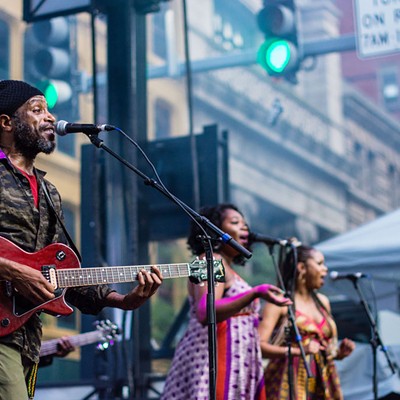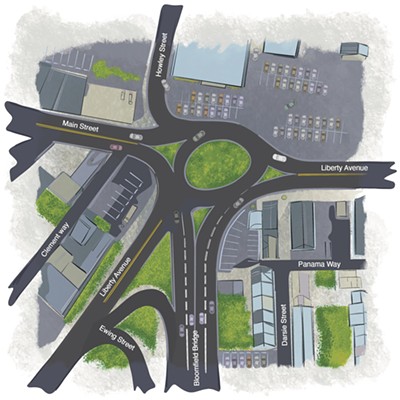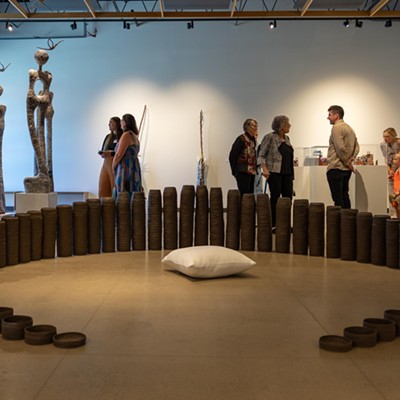The internet's role in influencing Pittsburgh’s alt-right killers
Both Robert Bowers and Joden Rocco participated with far-right groups online, and SPLC believes those groups could be encouraging them to violence.
[
{
"name": "Local Action Unit",
"component": "24929589",
"insertPoint": "3",
"requiredCountToDisplay": "1"
}
]
Last week, conservative-political consultant Dennis Roddy told KDKA that alleged Tree of Life shooter Robert Bowers acted not out of any specific ideology, but out of self-hatred and a deep sense of failure.
Bowers reportedly shouted "All Jews must die because they are committing genocide against my people," as he surrendered to police.
Roddy, a former reporter who has written about hate groups in the past, acknowledged the role the internet has played in stoking far-right extremists like Bowers, but then speculated that Bowers “could have latched onto some extreme left ideology.”
But data shows that violent people are latching onto right-wing or alt-right groups at much higher rates than any alleged extreme leftists.
A February study from the advocacy group Southern Poverty Law Center showed since 2014 there have been at least 13 alt-right related fatal episodes, leaving 43 dead and more than 60 injured.
Pittsburgh alone potentially added two killers and 12 victims to that list with the alleged killings carried out by men with far-right online histories, Bowers and Joden Rocco.
Rocco is a North Hills man who allegedly stabbed and killed Dulane Cameron Jr., a 24-year-old black man from Beaver County, at a North Shore bar in August. Rocco, who is white, reportedly shouted the n-word several times shortly before allegedly stabbing Cameron.
Left-wing incited violence does happen, as when members of Congress were shot at during a baseball practice in June 2017, but those incidents are far outnumbered by right-wing incidents. According to Alex Nowrasteh of the libertarian Cato Institute, right-wing terrorists have killed 10 times as many people as left-wing terrorists since 1992.
Heidi Beirich is the director of SPLC’s Intelligence Project. She says the internet has become a powerful tool in spreading right-wing extremism. Of the 15 alt-right fatal episodes since 2014 (13 documented by SPLC and two Pittsburgh incidents), 12 have been carried out within the last two years.
“People go down a rabbit hole of hate,” says Beirich. “Without the web, this just couldn’t happen. Even if you went to the library and read and enjoyed [Adolf Hitler’s] Mein Kampf, that is not the same as the echo chamber that exists online.”
Both Bowers and Rocco had scores of interactions with groups that pushed racist, anti-semitic, and anti-immigrant content. According to the Pittsburgh Post-Gazette, Bowers shared most often on an account linked to a “Jack Corbin” or “Pale Horse.” These accounts are reportedly linked to the same user, who posted insults to those advocating for the removal of a Confederate monument in North Carolina. Bowers also ran an account on Gab, a social-media platform popular with neo-Nazis and white nationalists. Bowers shared information about Christian Identity, a racist and anti-semitic group, according to SPLC.
He also shared posts about the migrant caravan and claimed that Jews were responsible for bringing “hostile invaders to dwell among us.” Reports have shown migrants in the caravan are overwhelmingly poor Central Americans; no evidence exists showing the caravan is infiltrated by a large number of criminals, and they have no affiliation with Jewish groups.
According to SPLC, Rocco liked nearly 50 pages that “traffic in memes and slang favored by the alt-right and the broader white nationalist movement.” On the same day that he allegedly stabbed Cameron, Rocco liked a meme from a group called Mediocre Memes and Ethnostate Dreams that showed an image of an idyllic American suburb with the text “Remember what they took from you.” Rocco lives in within the North Hills School District boundaries, which is 92 percent white.
Beirich says far-right ideas that were typically reserved only for far-right websites are starting to gain traction in the mainstream. She notes how Fox News hosts recently shared conspiracy theories about South African white farmers that were originally espoused by far-right online groups.
Beirich says tech companies need to make changes so it is harder for alt-right extremists to find content that supports their extreme views. She says currently many tech companies are doing the opposite.
“When someone googles ‘black crime,’ and then click on alt-right websites, Google in the future then leads then to more alt-right websites, instead of to the truth,” says Beirich.
Beirich says tech companies can change algorithms to play down content from alt-right sources and social-media companies can ban the sharing of alt-right memes.
She worries that if these policies continue, an increased rate of violent, alt-right linked attacks could continue. “This is a serious problem.”
Bowers reportedly shouted "All Jews must die because they are committing genocide against my people," as he surrendered to police.
Roddy, a former reporter who has written about hate groups in the past, acknowledged the role the internet has played in stoking far-right extremists like Bowers, but then speculated that Bowers “could have latched onto some extreme left ideology.”
But data shows that violent people are latching onto right-wing or alt-right groups at much higher rates than any alleged extreme leftists.
A February study from the advocacy group Southern Poverty Law Center showed since 2014 there have been at least 13 alt-right related fatal episodes, leaving 43 dead and more than 60 injured.
Pittsburgh alone potentially added two killers and 12 victims to that list with the alleged killings carried out by men with far-right online histories, Bowers and Joden Rocco.
Rocco is a North Hills man who allegedly stabbed and killed Dulane Cameron Jr., a 24-year-old black man from Beaver County, at a North Shore bar in August. Rocco, who is white, reportedly shouted the n-word several times shortly before allegedly stabbing Cameron.
Left-wing incited violence does happen, as when members of Congress were shot at during a baseball practice in June 2017, but those incidents are far outnumbered by right-wing incidents. According to Alex Nowrasteh of the libertarian Cato Institute, right-wing terrorists have killed 10 times as many people as left-wing terrorists since 1992.
Heidi Beirich is the director of SPLC’s Intelligence Project. She says the internet has become a powerful tool in spreading right-wing extremism. Of the 15 alt-right fatal episodes since 2014 (13 documented by SPLC and two Pittsburgh incidents), 12 have been carried out within the last two years.
“People go down a rabbit hole of hate,” says Beirich. “Without the web, this just couldn’t happen. Even if you went to the library and read and enjoyed [Adolf Hitler’s] Mein Kampf, that is not the same as the echo chamber that exists online.”
Both Bowers and Rocco had scores of interactions with groups that pushed racist, anti-semitic, and anti-immigrant content. According to the Pittsburgh Post-Gazette, Bowers shared most often on an account linked to a “Jack Corbin” or “Pale Horse.” These accounts are reportedly linked to the same user, who posted insults to those advocating for the removal of a Confederate monument in North Carolina. Bowers also ran an account on Gab, a social-media platform popular with neo-Nazis and white nationalists. Bowers shared information about Christian Identity, a racist and anti-semitic group, according to SPLC.
He also shared posts about the migrant caravan and claimed that Jews were responsible for bringing “hostile invaders to dwell among us.” Reports have shown migrants in the caravan are overwhelmingly poor Central Americans; no evidence exists showing the caravan is infiltrated by a large number of criminals, and they have no affiliation with Jewish groups.
According to SPLC, Rocco liked nearly 50 pages that “traffic in memes and slang favored by the alt-right and the broader white nationalist movement.” On the same day that he allegedly stabbed Cameron, Rocco liked a meme from a group called Mediocre Memes and Ethnostate Dreams that showed an image of an idyllic American suburb with the text “Remember what they took from you.” Rocco lives in within the North Hills School District boundaries, which is 92 percent white.
Beirich says far-right ideas that were typically reserved only for far-right websites are starting to gain traction in the mainstream. She notes how Fox News hosts recently shared conspiracy theories about South African white farmers that were originally espoused by far-right online groups.
Beirich says tech companies need to make changes so it is harder for alt-right extremists to find content that supports their extreme views. She says currently many tech companies are doing the opposite.
“When someone googles ‘black crime,’ and then click on alt-right websites, Google in the future then leads then to more alt-right websites, instead of to the truth,” says Beirich.
Beirich says tech companies can change algorithms to play down content from alt-right sources and social-media companies can ban the sharing of alt-right memes.
She worries that if these policies continue, an increased rate of violent, alt-right linked attacks could continue. “This is a serious problem.”



















